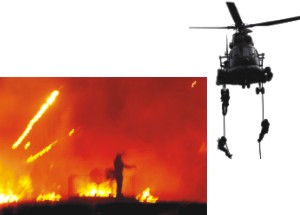|
Musings
The Cost of War
Sanjida Khan
 Did you know that in the centuries before and decades after the American Civil War, including the war itself, doorways were wide, not because of the width of women's skirts, but so coffins could be passed through, with a pallbearer on either side? Did you know that in the centuries before and decades after the American Civil War, including the war itself, doorways were wide, not because of the width of women's skirts, but so coffins could be passed through, with a pallbearer on either side?
John Holley and his wife, Stacey, were stunned when they found out the body of their only child, Matthew John Holley, who died in Iraq last month, would be arriving at Lindbergh Field as freight. Dead heroes are supposed to come home with their coffins
draped with the national flag -- greeted by a colour guard. But in reality, many are arriving as freight on commercial airliners -- stuffed in the belly of a plane with suitcases and other cargo! Is this the dignity, care and respect with which fallen soldiers are transported in their hometowns?
A mistake, crime or plague, as we may term it, war is an anachronism, which no longer serves any purpose. Harshness of human aspiration, an utter disregard for the value of human life and blind indifference to suffering, excessive selfishness, greed, barbarism, oppression, domination, cowardice and courage, self-interest are among the emotions, sentiments and attitudes of war. War is a curse to humanity. There are, doubtless, people who consider war as something grand and heroic and regard it as something that brings out the best in man, but this does not in any way alter the fact that war is a terrible, dreadful calamity, and this is especially true of an atomic or nuclear war. Merciless slaughter and butchery, poverty and ruin!
In our own time, the costs of war, or war-readiness, are probably larger than at any time in history, in relation to other human needs. The cost squeeze has led to a new type of society, perhaps best termed a “depleted” state, in which the military has drained resources from all other social functions. North Korea is a particularly ghoulish example, where starvation coexists with nuclear weapons development. However and whenever war began, it has persisted and propagated itself with the terrifying tenacity of a beast attached to the neck of a living prey, feeding on human effort and blood. War is too complex and collective an activity to be accounted for by any war-like instinct lurking within the individual psyche.
A catalogue of blunders, never justified. It's been rightly said by someone, “Every gun that is made, every warship launched, every rocket fired signifies, in the final sense, a theft from those who hunger and are not fed, those who are cold and not clothed.” There is nothing that war has ever achieved that we could not better achieve without it.
It poisons everyone who is engaged in it, however different they are in many ways, turns them into killers and torturers. It pretends to be concerned with toppling tyrants, and may in fact do so, but the people it kills are the victims of the tyrants. It appears to cleanse the world of evil, but that does not last, because its very nature spawns more evil. War is a drug. It gives a quick high, the thrill of victory, but that wears off and then comes despair.
Walking through the ruined cities after a war is to feel an actual doubt about the continuity of civilisation. Where we have cure to almost all diseases to save mankind, we too have the invention of nuclear bombs to destroy human race in a fraction of a second!
The death of one man is a tragedy; the death of millions is a statistic.
Gandhi once stated, “What difference does it make to the dead, the orphans, and the homeless, whether the mad destruction is wrought under the name of totalitarianism or the holy name of liberty and democracy?” Abjuring violent speech and imagery, promoting respect for human diversity-these will make little contribution to the abolition of war. It would be far better to think of war as something external to ourselves, something which has to be uprooted, everywhere down to the last weapon and bellicose pageant. The idea of a war to end war is one of its oldest and cruelest tricks.
Copyright (R) thedailystar.net 2008
|
